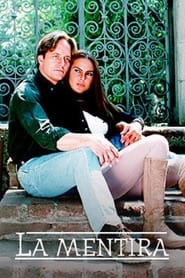Las Estrellas TV Series - Page 16
-
Blind Date
2019
star 7.4Lucía is a vlogger whose life depends on other people's opinions, and especially that of Maura, her mother, who watches over her all day. When Lucía's sister announces her engagement, her mother begins to worry about Lucía's appearance and emotional stability, betting that she will attend the wedding alone, dressed in black and heavier than ever. Lucía will have 258 days to lose weight, change her image and find a boyfriend. The bet with her mother goes viral and throughout the story Lucía shares the events of each blind date. -
The Flight to Victory
2017
star 6Victoria is a free spirited girl from a humble background and an aspirant Sprinter. She was abandoned by her biological mother when she was a child. A woman named Chencha took her in and treated her as her own daughter. Victoria dreams to become a Champion at the Olympics and much determined to fight any obstacle that gets her way. Victoria also finds herself in between two men, Andres and Raul who are willing to fight for her love. -
Los Elegidos
2019
star 8.4A group of children and adolescents with supernatural abilities pose as a family to hide their powers from a volatile military man who seeks to use them for nefarious deeds. -
Imperio De Mentiras
2020
star 7.4Elisa Cantú never imagined that, upon returning to Mexico from New York, where she resides, she would encounter an unexpected tragedy that changes her life. The night Elisa would celebrate her birthday, fate leads her to meet Leonardo Velasco, a policeman in love with Julia, a teacher, to whom he was to marry. At the end of the evening, Leonardo receives an emergency call, in which the discovery of two bodies is reported, one of them is that of his fiancée, who lies next to the body of Augusto Cantú, millionaire businessman and father of Elisa. Elisa and Leonardo will come together to search for the truth of what happened. -
Mágica juventud
1992
Mágica juventud
1992
-
This Is Silvia Pinal
2019
star 7A biography of Silvia Pinal, Mexican actress, singer, and producer, showing the professional as well as personal parts of her life. Partial narration by the legend herself. -
Prisionera De Amor
1994
star 6.385 episodes (1994). Cristina Carbajal is a woman who has paid an unjust sentence for having been wrongly blamed for the death of her husband. After ten years locked up, she manages to get out of prison for good behavior. Her daughters Karina and Rosita, who were only five years and one year old when her mother was incarcerated, are now 15 and 11 years old. They have been raised by her father's uncles, Braulio and Eloisa Monasterios. The Monasteries hate Cristina, since they believe that she is responsible for the death of her nephew, and they have told the girls that they are orphans. -
Papás por conveniencia
2024
star 7.8Tino is a single father, full of debt, and faces tough challenges in raising his two children. Aidé is a great businesswoman and mother of two teenagers, she seems to have it all, at least on the surface. One day, Tino discovers that he is the father of Aidé's children, and together, they decide to build a new family, even if, at first, it is for their interests. However, they will realize that things are not as easy as they thought. Since their house has become a battlefield, they must overcome several obstacles to find love and achieve happiness. -
Carrusel
1989
star 7.7Carrusel is a Mexican telenovela, produced by and first broadcast on Televisa in 1989. It covers daily life in a Mexican elementary school and the children's relationships with a charismatic teacher named Jimena. Among other plot devices, it deals with the differences between the upper and lower classes of Mexican society — specifically as seen in a romantic relationship between Cirilo, a poor black boy, and a spoiled rich girl, Maria Joaquina Villaseñor. -
I Have Known You All My Life
2021
star 2Pedro, unhappy in his marriage of convenience, falls in love with Vera during a business trip. After his father blackmails him into breaking Vera's heart, fate brings the two together again years later. -
Amor Real
2003
star 7.7True love threatens to tear a family apart in this epic Mexican serial set in the 1800s. Rich and beautiful Matilde falls in love with Adolfo, but her mother, Augusta, disapproves of the relationship when she learns Adolfo is poor. Augusta forces her daughter to marry rich and handsome Manuel Fuentes Guerra, but Matilde plays with fire by continuing to be with Adolfo. Adela Noriega, Fernando Colunga, Helena Rojo and Chantal Andere star. -
Alborada
2005
star 5Alborada is a telenovela made by the Mexican TV network Televisa. It is an historical drama, set in colonial Panama and Mexico a few years before Mexican Independence from Spain. The series was broadcast from December 2005 to April 2006 on Univision in the United States. Alborada won the TV y Novelas award for best telenovela of the year. -
Secrets at the Hotel
2016
star 7The story of Secrets at the Hotel begins in 1908. Julio Olmedo and Isabel Alarcón travel on the same train to the Gran Hotel, property of the Alarcón family. Both of them ignore that their lives will take a new twist in that place, produced by love, treason, and the secrets hidden there. -
La historia de Juana
2024
star 8.2Juana's Story, coming soon by #LasEstrellas | New soap opera for TelevisaUnivision -
XHDRBZ
2002
star 7.9XHDЯBZ. The show was a Mexican sitcom produced by Televisa and broadcast by the Canal de las Estrellas network. XHDRBZ emulates a television channel that broadcasts sketches. When a sketch finished, credits were shown, like in a real television program. XHDЯBZ was created by Eugenio Derbez in 2002, whose series marked his debut as producer. The show ran for two seasons since 2002, until 2006. Derbez ended production, choosing to expand one of the show's most popular segments, la Familia P.Luche, into its own hour-long show. Both shows are broadcast in the United States on the Galavisión network. Today the show is transmitted in Latin America and Europe. -
Por siempre Joan Sebastián
2016
star 6.9Biographical miniseries about the late Mexican singer Joan Sebastian. -
The Usurper
2019
star 6.9A humble young woman allows herself be manipulated by her twin sister to replace her so she can leave with another man. -
El equipo
2011
star 2El Equipo is a Mexican series starring Alfonso Herrera, Zuria Vega, Alberto Estrella and Fabián Robles are the protagonists. Is a series that blends action, drama, love, and shows the work and effort of the Mexican federal police, who every day risk their lives to protect society. The story centers around Santiago, Fermin, Magda and Mateo, who at one time in his life made the decision to become a Federal Police officer. In each chapter, the team will solve a different case where we can see the intelligence process, the operation and the capture of the offender while the characters must face their feelings and solve their own problems of everyday life. A blockbuster inspired by real events, produced by Pedro Torres and directed by Carlos Garcia Agraz and Chava Cartas.



















